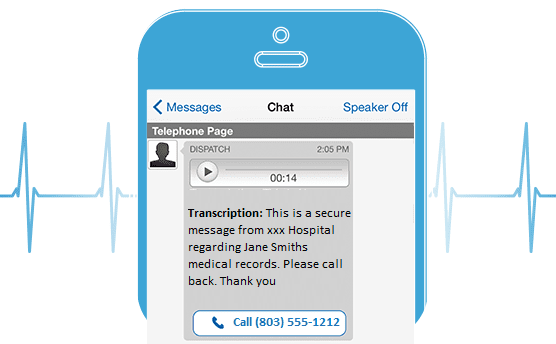
Reliable Call Answering Services For Healthcare Facilities
Healthcare facilities often deal with specific difficulties in communicating with patients, particularly when using medical answering services and telecommunication. Answering services and call centers are important for effective operations and improving patient care through service agreements and remote help. Learn about the various services offered, their advantages, and important points for selecting the right provider, including online communication plans and health care services. We’ll also dive into compliance issues and share real-world success stories. Learn how a good answering service can improve communication and efficiency in healthcare, enhancing patient involvement and healthcare management.
Definition and Importance
Medical answering services are important for healthcare providers to improve patient access and protect patient privacy.
Answering services are specialized call management solutions that support healthcare providers in managing patient inquiries and appointment scheduling effectively.
These services improve patient care by guaranteeing calls are quickly answered at all times, including evenings and weekends.
For example, using providers like Ruby or Answering Service Care can help manage overflow calls and provide 24/7 support. This increases patient happiness and cuts down on missed appointments.
Using scheduling software like Zocdoc or Calendly helps manage appointments smoothly, providing instant updates on open time slots.
By responding quickly and managing patient questions effectively, healthcare providers can concentrate more on giving high-quality care.
Overview of Healthcare Needs
Telehealth and healthcare technology are redefining patient expectations, creating a demand for specialized healthcare communication tools.
Healthcare providers face increasing demands for efficient patient communication, driven by the rise of telehealth services and 24/7 availability expectations.
In fact, studies show that over 60% of patients prefer telehealth for its convenience, leading to an uptick in appointment volumes.
To manage this surge, providers should consider advanced communication tools like virtual answering services, which can respond to queries in real-time.
For example, services like Zocdoc and SimplePractice handle patient booking and send automatic notifications and follow-ups, reducing missed appointments by up to 30% (our guide on effective patient scheduling strategies offers insights into optimizing these processes).
Using these technologies can greatly improve how patients interact with and feel about their care.
Types of Answering Services

Different answering services are set up to handle communication needs in healthcare, making sure patients get quick help anytime. To understand how these options stack up against traditional solutions, explore our expert opinion on Medical Answering Service vs. In-House Staff.
24/7 Live Answering
24/7 support is essential in providing emergency response and after-hours support to medical offices.
24/7 live answering services provide immediate access to healthcare professionals, ensuring patient inquiries are addressed around the clock.
Companies like AnswerNet specialize in offering these essential services, ensuring that healthcare facilities can attend to patient needs at any hour.
Their trained staff manages scheduling appointments, answering questions about medications, and dealing with urgent calls effectively.
For instance, a small clinic might see a 30% reduction in missed calls by implementing a live answering service, freeing up staff to focus on in-person care during busy hours.
Connecting these services with automatic systems like chatbot solutions can improve how quickly responses are given.
Automated Answering Systems
Automated systems improve call routing and offer virtual receptionist services.
Automated answering systems use current technology to handle patient calls fast, providing instant responses to common inquiries.
These systems, like Grasshopper and Ruby Receptionists, can make it much easier to manage appointment scheduling and communicate with patients.
Grasshopper, for instance, allows practices to set up custom greetings and forward calls to designated team members based on availability.
Ruby Receptionists offers live virtual receptionists, ensuring patients always reach a real person during business hours.
Connecting these systems with appointment management software like Calendly can reduce confusion and lower the number of missed appointments, improving the patient experience.
Benefits of Answering Services for Healthcare

Answering services improve healthcare administration and operational efficiency.
Using answering services offers many benefits to healthcare providers, greatly improving communication with patients and the efficiency of daily tasks. Worth exploring: how medical answering service benefits can propel your practice forward.
Improved Patient Communication
Better communication methods lead to happy patients and successful follow-up care.
Answering services improve how patients communicate by offering quick and correct details, resulting in higher patient satisfaction.
Using services like eCall or Answering Service Care can improve how quickly your practice responds. For instance, eCall offers 24/7 live operators who can handle appointment scheduling and manage patient inquiries, reducing missed calls by up to 40%.
Simultaneously, Answering Service Care offers scripts made to fit your needs, keeping the messaging consistent. By using these services together, practices have noted a 30% increase in patient satisfaction scores, demonstrating the clear benefits of quick communication and better service.
Enhanced Operational Efficiency
Making healthcare processes better and managing customer relationships well improves how smoothly operations run.
By outsourcing call handling, healthcare facilities can reduce operational burdens, allowing staff to focus on core responsibilities and improving efficiency.
For example, a clinic that switched to a dedicated answering service saw a 50% reduction in patient wait times. By implementing tools like CallRail for tracking and managing call metrics, they improved response rates.
Studies show that places using services like Ruby or AnswerConnect improve patient satisfaction and make it easier to schedule appointments. Everyone gains from this result: staff handle fewer admin tasks, and patients get better care, which makes processes smoother and increases work output.
Cost-Effectiveness
Cost-effectiveness is achieved through service automation and efficient service quality management.
Investing in answering services can lead to significant cost savings, with average monthly costs ranging from $200 to $1,000 compared to hiring in-house staff.
By utilizing answering services, businesses can save on salaries and benefits, which can total $3,000 to $5,000 per month for a full-time employee.
For example, a small business that spends $600 monthly on an answering service may redirect saved funds to marketing efforts, potentially increasing revenue.
Notable services like AnswerConnect and Ruby offer 24/7 support for approximately $300 to $500 monthly, allowing companies to maintain customer engagement without the overhead.
Switching to these services can make responses faster and cut down operational expenses a lot.
Choosing the Right Answering Service
Choosing involves considering healthcare consulting services and answering service technology.
Picking the right answering service is very important for healthcare providers because it affects how they talk to patients and run their daily tasks.
Key Features to Look For
Key points include using various communication methods and offering service in different languages for personalized assistance.
Important features like following HIPAA rules, support for multiple languages, and adding live chat are important when looking at healthcare answering services.
Consider features like call routing, which directs patient queries to the appropriate departments or specialists, improving response times.
Get scripts that help your staff provide accurate information and can be changed to suit each patient’s specific needs.
Efficient reporting tools can track call volume and patient trends, helping you make informed operational decisions.
24/7 availability guarantees patients can reach you at any time, enhancing their overall experience and satisfaction.
Questions to Ask Providers
Ask providers about billing inquiries handling and healthcare staffing capabilities.
When assessing potential answering service providers, healthcare facilities should inquire about their experience, technology, and compliance with regulations.
To guide your evaluation, consider these key questions:
- What is your experience in the healthcare sector, specifically with similar facilities?
- Can you demonstrate HIPAA compliance and share documentation?
- What technology platforms do you use for managing calls, and how do they improve patient communication?
- Inquire about service level agreements (SLAs) that outline response times and handling protocols.
- Ask about staff training practices-how often are employees trained on industry regulations and communication skills?
These questions will confirm that the service meets patient care standards.
Compliance and Security Considerations

Compliance considerations must include data security measures and healthcare analytics integration.
Healthcare answering services must follow HIPAA and data protection rules to keep patient information private and maintain trust. Explore the importance of ensuring your medical answering service is HIPAA compliant to safeguard sensitive patient information effectively.
HIPAA Regulations
HIPAA compliance is central to protecting patient records management and ensuring patient-centered care.
Compliance with HIPAA regulations is essential for any answering service handling patient information to prevent legal repercussions and maintain trust.
To follow the rules, answering services should take certain steps like training employees on HIPAA rules, using secure communication tools, and keeping patient records safe.
For example, utilizing tools like secure messaging apps (e.g., Signal or encrypted emails) helps protect patient data during transmission. Regularly checking and evaluating risks can find possible weaknesses.
It’s important to have a clear privacy policy that explains to patients their rights and how their information is used. This helps keep things open and builds trust.
Data Protection Measures
Data protection involves utilizing VoIP and quality assurance protocols.
Strong data protection steps are essential for keeping patient information safe, such as using encryption and secure access methods.
To make security better, answering services need to have different layers of safety measures. The AES-256 encryption method protects information by making it unreadable during transmission or storage.
Protocols like multi-factor authentication stop unauthorized access, which is important for keeping patient information private. Regular security audits and employee training on data protection best practices are also essential.
By using both firewalls and intrusion detection systems, services can better watch for and react to possible risks, building a strong defense against data leaks.
Case Studies and Success Stories

Looking at actual examples of successful answering services can show healthcare facilities how to improve their customer service and what results to expect through effective healthcare marketing. Curious about how medical answering services help handle angry callers? Our analysis explains the key factors.
Examples from Various Healthcare Facilities
Healthcare facilities such as Benchmark Medical and People’s Clinic have successfully improved patient communication and operational efficiency through dedicated medical answering solutions and medical call handling services.
Benchmark Medical started using a 24/7 answering service, which used the CallRail platform for call tracking and analyzing inbound calls and outbound calls. This investment led to a 30% increase in online appointment booking as patients found it easier to reach them.
Meanwhile, People’s Clinic implemented a live chat feature through Zendesk, enhancing customer experience by reducing patient wait times and improving satisfaction scores.
Lessons from both facilities highlight the importance of tailoring communication strategies and medical communication tools to meet specific patient needs, ensuring the service aligns with their practice management and operational goals.
Upcoming Directions for Medical Answering Services
New trends in answering services involve using AI to improve patient interaction and engagement metrics, and using predictive analytics to make service quality better and integrate healthcare.
Soon, we will see better voice recognition systems and voice messaging that use patient records to create personalized greetings. This will make interactions feel more personal and improve how patients and healthcare providers communicate.
Tools like Zendesk and Aircall, which use internet-based calling technology (VoIP), can speed up reply times and allow smooth transitions between AI and human agents.
As patient expectations shift towards immediate communication, answering services could adopt 24/7 chat support with multi-language support, ensuring accessibility and service customization at all times.
Using these technologies along with organizing patient care and monitoring patients from a distance will improve how well services are provided, resulting in happier patients who are more likely to come back.

